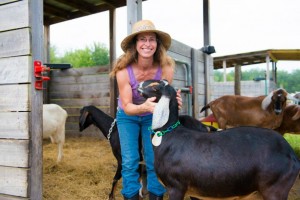 Serenity Acres Farm located in Madison County, Florida lives by the motto, “happy soaps from happy goats.” Serenity Acres Farm is dedicated to keeping an environment that ensure that their goats happy and excited to be milked every day.
Serenity Acres Farm located in Madison County, Florida lives by the motto, “happy soaps from happy goats.” Serenity Acres Farm is dedicated to keeping an environment that ensure that their goats happy and excited to be milked every day.
In this Q&A with Serenity Acres Farm founder Julia Shewchuk, we talk about her life as a farmer, her venture into handcrafting soaps, and the importance of keeping an Animal Welfare Approved farm.
How and when did you get into farm life, and what led you to decide to start making soaps?
We have had horses and chickens for a long time but didn’t really embrace farm life until 2007 when we moved to our current farm in North Florida to escape urban life, its traffic, and crime. We also wanted to become more self-sufficient and grow our own vegetables and dairy to get away from processed foods and foods full of chemicals, antibiotics, and hormones. We started out with a small garden, two horses, some chickens, three dogs, and three cats. Then we decided to purchase a couple of goats so we could produce our own dairy products. We underestimated the amount of milk even two dairy goats in milk can produce and had to come up with ways to use the milk. One of them was to produce goat milk soaps. Making the soap turned out to be so much fun combining a lot of creativity and  science, and was really only one more step in the direction of having wholesome healthy products. One Christmas we participated in a local Christmas Fair and sold $750 worth of soap in one weekend. That was the beginning of our business partnership with the goats.
science, and was really only one more step in the direction of having wholesome healthy products. One Christmas we participated in a local Christmas Fair and sold $750 worth of soap in one weekend. That was the beginning of our business partnership with the goats.
It looks like your goats have a lot of personality! Can you tell us a little about them?
Goats are like little kids, very smart, curious about the world around them, like to have fun, and often get into mischief. Each goat has its own personality which comes out at a very early age. Some are very cuddly and want to be held all the time, even at a full grown 200 pounds; some are like clowns, befriending the chickens and then playfully pulling out a tail feather; and others are divas, who will let you know if something isn’t going their way. Goats are very social animals who form strong bonds with their companions and humans, full of emotions, expressions, and love. There is no way anyone can be sad around a goat, especially goat kids, and we are taking advantage of that fact by training some of our goats to be therapy goats who will go out a visit nursing homes and schools.
Your farm is Animal Welfare Approved. How important was it to get that certification?
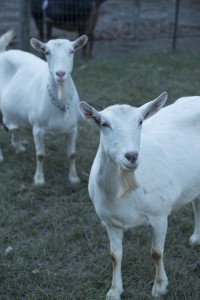 To us, it was very important to get that certification to acknowledge and certify that we are an independent family farm which adheres to the highest welfare and environmental standards, beyond organic, with all our animals. Animal Welfare Approved is the only truly pasture-based certification and food label whose standards guarantee responsible farming practices and healthy natural living conditions for the animals. With it we demonstrate that we strive to reduce our hoof print on Mother Earth.
To us, it was very important to get that certification to acknowledge and certify that we are an independent family farm which adheres to the highest welfare and environmental standards, beyond organic, with all our animals. Animal Welfare Approved is the only truly pasture-based certification and food label whose standards guarantee responsible farming practices and healthy natural living conditions for the animals. With it we demonstrate that we strive to reduce our hoof print on Mother Earth.
What’s the most surprising thing about working with goats?
The most surprising thing about working with goats is how they acknowledge and return your love, that they are very picky eaters, and how passionate we have become about them. We think they are magical!
What are the differences between goat and cow dairy?
It takes the milk of approximately five to ten goats to equal the production of one cow. The taste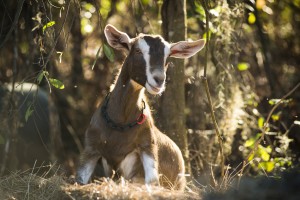 of goat milk is actually slightly sweeter than that of cows milk. However, mass-produced goat milk sold in most stores can be have a “goaty” taste due to different methods of processing, packaging, and pasteurization. Goats also convert the carotene in their diet to vitamin A more efficiently than cows do, producing whiter milk, cream, and butter. The amount of cream in goat milk is not insignificant; however, the fat globules in goat milk are much smaller than those in cow milk resulting in the cream remaining suspended throughout the milk instead of rising to the top, it is therefore naturally homogenized, which also makes the milk easier to digest for many people. Goat milk contains less lactose (milk sugar) than cows milk, which makes it easier on our stomachs simply because we need less of a particular type of enzyme to break down the lactose. It’s also less allergenic due to the protein contents. One of the most common allergies in children under the of age of 3 in the United States is a dairy-allergy and it has a lot to do with a particular protein in the milk called Alpha s1 Casein. The levels of Alpha s1 Casein are about 89% less in goats milk. – which is one of the main reasons why people who have dairy sensitivities may get away with consuming goats milk as an alternative.
of goat milk is actually slightly sweeter than that of cows milk. However, mass-produced goat milk sold in most stores can be have a “goaty” taste due to different methods of processing, packaging, and pasteurization. Goats also convert the carotene in their diet to vitamin A more efficiently than cows do, producing whiter milk, cream, and butter. The amount of cream in goat milk is not insignificant; however, the fat globules in goat milk are much smaller than those in cow milk resulting in the cream remaining suspended throughout the milk instead of rising to the top, it is therefore naturally homogenized, which also makes the milk easier to digest for many people. Goat milk contains less lactose (milk sugar) than cows milk, which makes it easier on our stomachs simply because we need less of a particular type of enzyme to break down the lactose. It’s also less allergenic due to the protein contents. One of the most common allergies in children under the of age of 3 in the United States is a dairy-allergy and it has a lot to do with a particular protein in the milk called Alpha s1 Casein. The levels of Alpha s1 Casein are about 89% less in goats milk. – which is one of the main reasons why people who have dairy sensitivities may get away with consuming goats milk as an alternative.
What goes into the process of making soap?
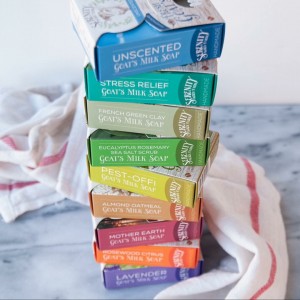 A lot of science, a lot of patience, and a lot of time. First the goats have to milked, then the soaps have to be made by meticulously combining all ingredients in exact quantities and exact amounts, and after molding and cutting the soap, giving it the time to cure into a beautiful bar of soap after 6 – 8 weeks.
A lot of science, a lot of patience, and a lot of time. First the goats have to milked, then the soaps have to be made by meticulously combining all ingredients in exact quantities and exact amounts, and after molding and cutting the soap, giving it the time to cure into a beautiful bar of soap after 6 – 8 weeks.
What other ingredients besides milk go into your soaps?
The only other ingredients you will find in our goat milk soap aside from fresh goat milk are the base oils: Grade A Olive Oil, Sustainable Organic Palm Oil, Coconut Oil; and the scent oils which are either essential oils or phthalate free and paraben free fragrance oils. Simple, transparent and honest.
What makes Serenity Acres’ soap unique?
Our soaps are unique because we use fresh goat milk from our very own goats, we do not use powdered milk. We also only use human grade ingredients to guarantee the highest and consistent quality. For example, many soaps contain pomace olive oil, which is much cheaper than Pure Olive Oil as it is extracted out of the pits with hexane, a cancer-causing petrochemical by-product. We also control the whole process on the farm: we own the goats, milk the goats, 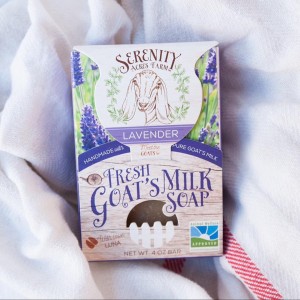 make the soap, package the soap and send out the soap. Our lifestyle and our packaging reflect the philosophy we have to reduce our hoof print on the earth. Our packaging is from recycled materials, we use soy ink and no glue. When you buy our soap, you buy into the farm, its goats, its stories, and its philosophy. The soaps are not only good for you, but they are good for the planet.
make the soap, package the soap and send out the soap. Our lifestyle and our packaging reflect the philosophy we have to reduce our hoof print on the earth. Our packaging is from recycled materials, we use soy ink and no glue. When you buy our soap, you buy into the farm, its goats, its stories, and its philosophy. The soaps are not only good for you, but they are good for the planet.
What are a few of your favorites that you make?
My favorites change with the season. My go-to for the spring and summer is our Pest-Off! Soap which we formulated with bug repelling essential oils and use on ourselves as well as a dog shampoo bar; our shaving soap is always in our shower along with the almond oatmeal and Mother Earth.
 What are a few things you’ve learned about life from this whole process?
What are a few things you’ve learned about life from this whole process?
Humility. Goats have a way of showing you that when you think you know everything, you need to think again. Patience. If you hurry farm life, you will make mistakes that will come back to haunt you. Hard work. I have learned that when you are passionate about something, you can move mountains to make it come to life and be successful, but it doesn’t come easy, the hours are long and the work is full of dirt. My mother told me 45 years ago after coming home with yet another scraped knee, that I would either marry a millionaire or a farmer. She almost had it right. I became a farmer. I chose the dirty life.

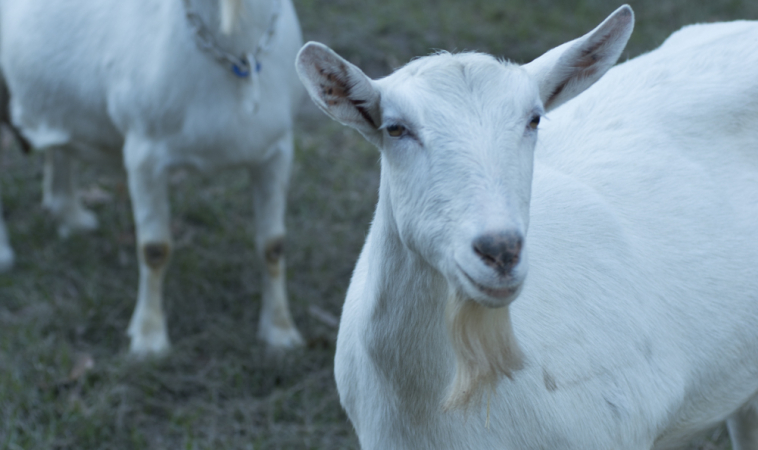
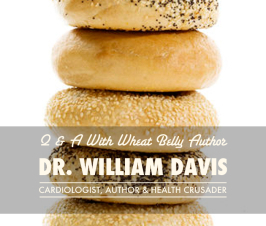













I have loved using goat soap for the first time lately. It is so nice to hear from those who make it. I look forward to trying these products soon!